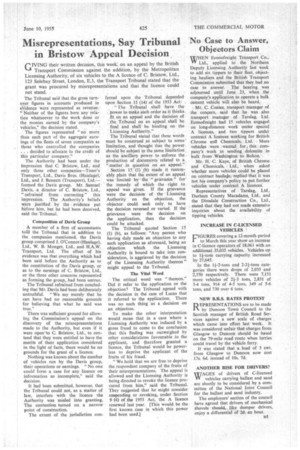Misrepresentations, Say. Tribunal in Bristow Appeal Decision,
Page 59

If you've noticed an error in this article please click here to report it so we can fix it.
GIVING their written decision, this week; on an appeal by the British Transport Commission against the addition, by the Metropolitan Licensing Authority, of six vehicles to the A licence of C. Bristow, Ltd., 123 Solebay Street, London, E.3, the Transport Tribunal stated that the grant was procured by misrepresentations and that the licence could not stand.
The Tribunal said that the gross turnover figures in accounts produced in ecidence were represented as revenue.• "Neither of the figures bore any relation whatsoever to the work done or the monies earned by the company's
vehicles," the decision stated. The figures represented "no more than such part of the aggregate earnings of the fleets of seven companies as those who controlled the companies . . . decided to allocate to the credit of this particular company."
The Authority had been under the impression that C. Bristow, Ltd., and only three other companies—Tozer's Transport, Ltd., Davis Bros. (Haulage). Ltd., and J. Bennett (Transport), Ltd.— formed the Davis group. Mr. Samuel Davis, a director of C. Bristow, Ltd., "refrained from correcting" this impression. The Authority's beliefs were justified by the evidence put before him, but he had been deceived, said the Tribunal.
Composition of Davis Group A member of a firm of accountants told the Tribunal that in addition to the companies mentioned, the Davis group comprised I. O'Connor (Haulage), Ltd., W. B. Monger, Ltd., and H.A.W. Transport, Ltd. The effect of his evidence was that everything which had been said before the Authority as to the constitution of the Davis group, or as to the earnings of C. Bristow, Ltd., or the three other concerns represented as forming the group, had been untrue.
The Tribunal refrained from concluding that Mr. Davis had been deliberately untruthful. "We say merely that he can have had no reasonable grounds for believing that what he said was true."
There was sufficient ground for allowing the Commission's appeal on the discovery of the misrepresentations made to the Authority, but even if it were open'to C. Bristow, Ltd., to contend that they were entitled to have the merits of their application considered in the light of facts, there would be no grounds for the grant of a licence.
Nothing was known about the number of vehicles run by the Davis group, their operations or earnings. "No one could form a case for any licence on information so incomplete," said the decision.
It had been submitted, however, that the Tribunal could not, as a matter of law, interfere with the licence the Authority was misled into granting. The contention turned on a narrow point of construction.
The extent of the jurisdiction con
ferred upon the Tribunal depended upon Section 15 (14) of the 1933 Act: "The Tribunal shall have the . power to make such order as it thinks fit on an appeal and the decision of the Tribunal on an appeal shall be final and shall be binding on the Licensing Authority."
The Tribunal stated that these words must be construed as subject to some' limitation, and thought that the power. should be subject to the same limitation as the ancillary power to enforce the production of documents related to a, "matter in question on .an appeal"
Section 15 -(1) _(b) Made it reasonably plain that the extent of an appeal was limited by' the ." grievance" for the remedy of which the right to appeal was given. If the grievance were the decision of the Licensing Authority on the objection, the objector could seek only to have the decision reversed or varied. If the grievance were the decision on the application, then the decision could be attacked.
The Tribunal quoted Section 15 (1) (b), as follows: "Any person who having duly made an objection to any such application as aforesaid, being an objection which the Licensing Authority is bound to take into consideration, is aggrieved by the decision of the Licensing Authority thereon" might appeal to the Tribunal The Vital Word The critical word was "thereon." Did it refer to the application or the objection? The Tribunal agreed with the decision in the case of Lucas that it referred to the application. There was no such thing as a decision on an objection.
To make the other interpretation would mean that in a case where a Licensing Authority was induced by a gross fraud to come to the conclusion that this finding was outweighed by other considerations favourable _to the applicant, and therefore granted a licence, the Tribunal would be powerless to deprive the applicant of the fruits of his fraud.
"We hold that we are free to deprive the respondent company of the fruits of their misrepresentations. The appeal is allowed and the Licensing Authority is being directed to revoke the licence procured from him," said the Tribunal. They suggested that he might consider suspending or revoking, under Section 9 (4) of the 1953 Act, the A licence renewed last year. [This would be the first known case in which this power had been used.]




























































































































































